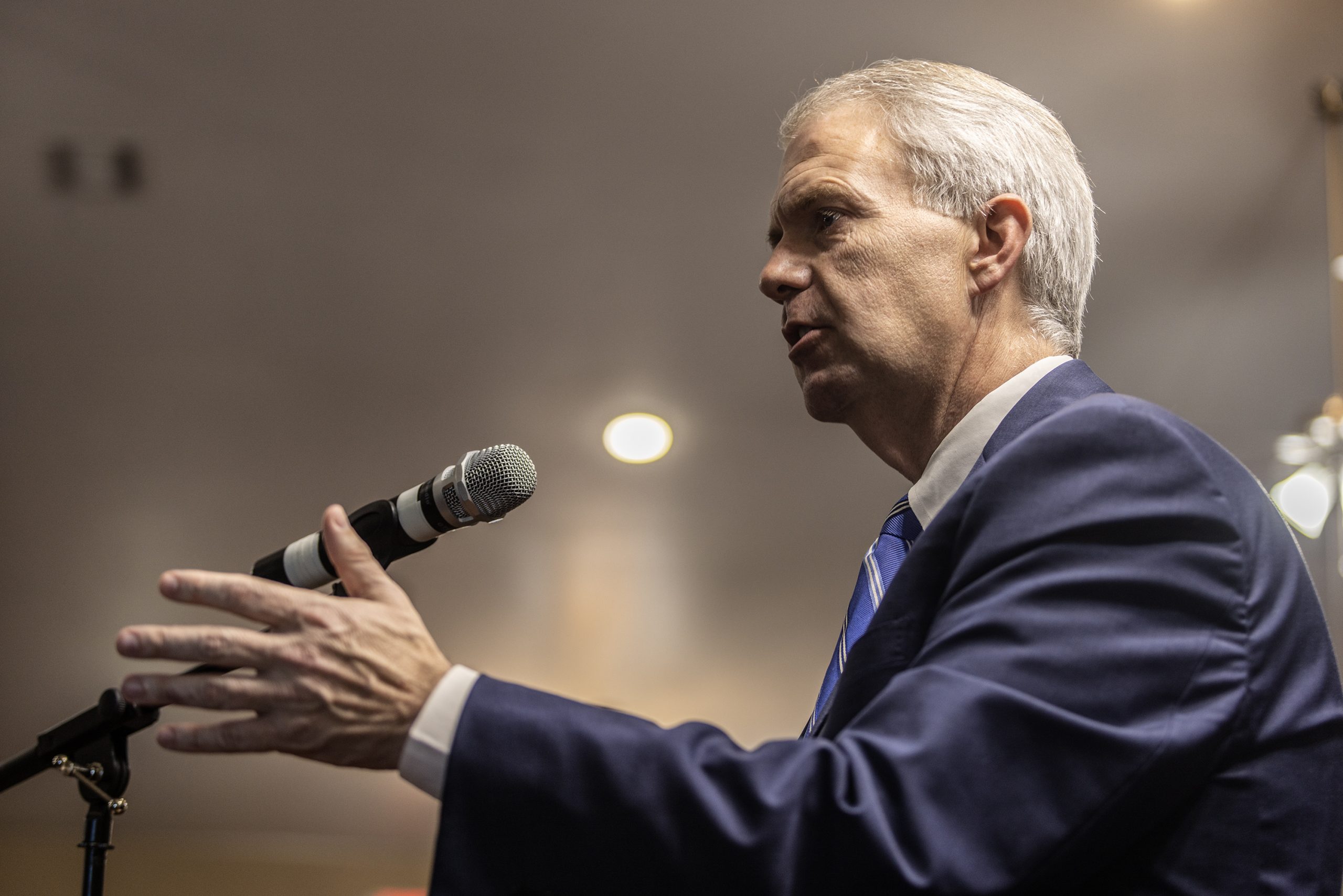Mississippi Today
Democrat Brandon Presley calls for overhaul of campaign finance laws


TUPELO — Democratic gubernatorial candidate Brandon Presley on Thursday called for state leaders to reform Mississippi’s notoriously lax campaign finance laws and expand the role of the state’s Ethics Commission to enforce lobbying campaign contribution regulations.
Speaking in Tupelo, Presley called on lawmakers to pass a law that transfers campaign finance filings from the Secretary of State’s Office, where it’s currently housed, to the Mississippi Ethics Commission, which only handles some aspects of the current rules.
The Democratic candidate, currently north Mississippi’s utility regulator, also urged state leaders to give the commission power to conduct random audits of candidates’ campaign finance donations and expenditures to keep him and other politicians “on our toes.”
“We’re going to propose this plan to restore pride, faith in state government,” Presley said, “to make sure that we’re not the laughingstock of the nation when it comes to campaign finance reports.”
The current campaign finance laws are a confusing, often conflicting patchwork that requires three different state agencies to have some role in enforcing the regulations.
“It’s a mess,” state Ethics Commission Director Tom Hood recently told Mississippi Today of Mississippi’s campaign finance laws. “Changes have been made multiple times over multiple years, and it’s like trying to put together a jigsaw puzzle that doesn’t fit.”
While confusing, most state leaders agree that candidates are currently supposed to file campaign finance reports with the Secretary of State’s office, but that agency mainly acts as a record-keeping entity. If candidates skirt the laws or fail to file a report, the agency forwards their name to the Ethics Commission for review.
The commission can then vote to levy fines against a candidate, but if a candidate fails to pay that fine, the commission, in theory, eventually notifies the Attorney General to consider filing a civil suit against them to recover the unpaid fine.
Mississippi also spends less money on ethics enforcement — $730,000 — than other surrounding states, such as Alabama, which spends more than $3 million a year on ethics accountability.
But Presley said if he is elected, he would also urge legislators to appropriate more money and resources to allow the commission to handle more responsibilities.
Other proposals Presley outlined are:
- Establishing a task force to recommend how state government can strengthen ethics regulations.
- Supporting legislation to prohibit companies seeking a license, permit, or non-competitive contract from the state from donating more than $250 to political campaigns from the date of solicitation and for 12 months after the final award is made.
- Requiring the governor’s office and all state agencies to keep records of all meetings with lobbyists and companies and individuals lobbying the government for contracts or legislation that benefits them.
- Encouraging that campaign finance reports to be available, submitted online, easily accessible to the public, and due every 30 days in an election year and quarterly in non-election years.
The Democratic candidate has made ethics reform a central part of his statewide campaign, and he has called on lawmakers to pass laws that ban state officials from raising money while the Legislature is in session.
The political discourse over ethics reform between Presley and Republican Gov. Tate Reeves has devolved into a separate issue over who has donated to the two candidates campaigns for public office.
When asked recently about his presumptive Democratic opponent’s ethics reforms proposals, Reeves’ campaign did not substantively address Presley’s policies, but criticized the Democratic candidate for accepting campaign donations from Richard Scruggs, who pleaded guilty to a federal bribery charge and a federal mail fraud charge in 2009.
Scruggs served a stint in prison, which he completed in 2014. He donated $10,000 to Presley’s campaign, according to the candidate’s most recent campaign finance report, and he regularly donates to political candidates in the state.
But Presley last week said he is complying with current campaign finance laws and pointed the finger back at Reeves for previously accepting donations from such Nancy and Zach New, who pleaded guilty to crimes related to the state’s welfare scandal and are waiting for a judge to determine their prison sentence.
Editor’s Note: Dickie Scruggs has been a donor of Mississippi Today. Donors do not influence Mississippi Today’s editorial decisions, and a list of our donors can be found here.
This article first appeared on Mississippi Today and is republished here under a Creative Commons license.
Mississippi Today
Gov. vetoes bill providing hospitals ‘stability’

Gov. Tate Reeves vetoed a bill Thursday that would help stabilize hospitals, calling it the “Grady Twin” of a bill he vetoed in March.
Lawmakers made some changes to the previously vetoed legislation in a new bill, but kept much the same. Reeves cited many of his same concerns this time around, including alleged contradictions and the loom of a deficit.
The bill, authored by Senate Medicaid Chairman Kevin Blackwell, R-Southaven, sought to make several changes to the Medicaid program – from mandating providers screen mothers for postpartum depression to requiring the agency to cover a new sleep apnea device.
Blackwell did not respond to a request for comment by the time of publication.
Arguably the largest impact of Senate Bill 2386 would have been that it called for locking in place supplemental payment programs that have been a lifeline for hospitals – but which are unreliable as they vary from year to year, according to Richard Roberson, CEO of the Mississippi Hospital Association.
That fluctuation makes it difficult for hospitals to plan what services they can offer.
“The supplemental payment language was intended to offer better budget predictability as hospitals move through these uncertain times and instructed the Division (of Medicaid) to maximize federal funding,” Roberson said. “… Hospitals, like other businesses, need stability to continue to serve their communities effectively.”
Supplemental payment programs bring in around $1.5 billion federal dollars to Mississippi hospitals each year.
Reeves said in his veto statements for both bills that locking the payment program in place is in contradiction with another of the bill’s mandates, which would change the program to allow out-of-state hospitals that border Mississippi to participate in the program.
“It is logically nonsensical for Senate Bill 2386 to, on the one hand, freeze the MHAP, while on the other hand, mandate that the Division open the program to include an additional hospital.”
But Roberson said the language of the bill would not prohibit the programs from growing – it would merely clarify what hospitals need to do to get paid.
Reeves again said the bill “seeks to expand Medicaid.” The bill brings forth code sections related to eligibility requirements, but it doesn’t call for expanding the Medicaid population by increasing the income threshold, which is what is typically referred to as Medicaid expansion under the Affordable Care Act.
Thursday’s vetoed bill was hospitals’ last recourse for stabilizing their budgets via legislation.
Richardson says the Mississippi Hospital Association has now turned its sights toward the Division of Medicaid to secure hospitals’ payment programs without the help of the Legislature.
“With or without Senate Bill 2386, we are hopeful the Division will work to stabilize the model,” Roberson said.
This article first appeared on Mississippi Today and is republished here under a Creative Commons Attribution-NoDerivatives 4.0 International License.
Mississippi Today
Parents, providers urge use of unspent TANF for child care

Child care providers, parents, children, legislators and advocates gathered outside the state Capitol Thursday to call on Mississippi to use unspent welfare funds and resume accepting child care certificate applications.
Last month, the Mississippi Department of Human Services announced it will temporarily stop accepting new applications, redetermination applications and “add a child” applications for the child care certificate program for certain families as the result of the loss of COVID-19 relief funds. The hold, started March 31, will continue indefinitely. The program provides child care vouchers to eligible families, often with a co-payment fee.
MDHS explained that without the COVID-19 relief funding the number of families with child care certificates is more than it can support long term. When asked how long the hold would last, chief communications director Mark Jones explained the hold would end when the number of children with certificates dropped below 27,000 children and $12 million in monthly costs.
The week before the hold began, on March 28, 36,186 children had child care certificates. 25,300 of them fit into one of the MDHS’s priority categories. 10,800 did not.
The Mississippi Low-Income Child Care Initiative, Child Care Directors Network Alliance, Mississippi Delta Licensed Child Care Providers, and Mississippi Black Women’s Roundtable organized Thursday’s gathering and press conference to implore MDHS to tap into unused TANF funds to book the child care payment program.
“DHS has about $156 million in money from prior grant years that has gone unspent,” said Carol Burnett, MLICCI’s executive director, at the press conference.
The child care payment program gets funding from federal and state sources. It received $127 million from the Child Care Development Fund in fiscal year 2024, as well as $7 million in state appropriations, and $25.9 million transferred from the Temporary Assistance for Needy Families grant.
That $25.9 million is 30% of the state’s annual TANF grant money transferred into funds for child care certificates. It is the maximum amount they’re allowed to transfer under federal law. The state also spends 85% of its money from the child care development fund on certificates, when federal law requires them to use at least 70%.
MLICCI and others want MDHS to add to that by spending current and carryover TANF funds on child care subsidies for families that qualify for child care certificates. According to a memo MLICCI prepared, this method does not require legislative action, has no spending limit, and is already used by other states.
Under the current hold, families can apply and get their certificates renewed if they fall in one of the following six categories: on Temporary Assistance for Needy FamiliesTANF or transitioning off of TANF, homeless, with foster children, teen parents, deployed military, orand with special needs. The Division of Early Childhood Care & Development will continue paying for certificates for all families until their certificates expire.
In a statement, MDHS’ chief communications officer Mark Jones said “MDHS understands these concerns and reaffirms its commitment to support child care, transportation, education, and other needs of families who need to return or remain in the workforce. Our aim is to ensure our approaches are sustainable.”
Burnett, parent KyAsia Johnson, state Rep. Zakiya Summers, D-Jackson, and multiple child care providers talked about the toll the hold has taken on child care centers and families. They also stated the importance of child care to sustain the state’s workforce, keep child care providers afloat, and educate young children.
They also urged citizens to contact the state’s political leadership to get their attention.
“This decision is putting people like me in an impossible situation,” said Johnson, a child care provider and parent. “What am I supposed to do without child care?”
Each provider spoke about how they had to explain the hold to parents, many of whom have had to pull their children out of day care. Cantrell Keyes, director of Agape Christian Academy World in Jackson, had five families pull their children out of her center. “More than half of my school tuition comes from CCPP,” she said.

Rep. Summers called on MDHS to lift the hold on child care applications, use the extra TANF funds, and communicate better with parents and providers.
“Right now, thousands of Mississippi children might lose child care, not because the need has disappeared, but because the agency has made a choice,” she said.
The hold on child care certificates comes at a time when many child care providers and parents are struggling to stay afloat amid high costs, high turnover and high demand.
Deloris Suel, who owns Prep Company Tutorial Schools in Jackson, said, “Child care is in crisis. We’re not heading for crisis, we’re in crisis.”
This article first appeared on Mississippi Today and is republished here under a Creative Commons Attribution-NoDerivatives 4.0 International License.![]()
Mississippi Today
Tyler Perry comedy about a Mississippi lieutenant governor ‘She The People’ set to stream on Netflix

Netflix has announced it will stream “She The People,” a comedy written, produced and directed by Tyler Perry based on a fictional newly elected Mississippi Lieutenant Governor, Antoinette Dunkerson, played by Terri J. Vaughn.
According to a trailer released Thursday and press about the show, the new Lt. Gov. Dunkerson character realizes her new job will be extremely tough due to a sexist and condescending governor.
Executive producers for the show include Niya Palmer, Vaughn and former Atlanta Mayor Keisha Lance Bottoms. The cast also includes Tre Boyd, Dyon Brooks, Jade Nova, Jo Marie Payton and Drew Olivia Tillman.
The first eight-episode season debuts May 22 on Netflix, with a second eight-episode season premiering Aug. 14.
This article first appeared on Mississippi Today and is republished here under a Creative Commons Attribution-NoDerivatives 4.0 International License.
-

 News from the South - Florida News Feed5 days ago
News from the South - Florida News Feed5 days agoJim talks with Rep. Robert Andrade about his investigation into the Hope Florida Foundation
-

 News from the South - Alabama News Feed7 days ago
News from the South - Alabama News Feed7 days agoOp-Ed: Colleges shouldn’t need remedial algebra classes: Five K-8 policy solutions to address math proficiency | Maryland
-

 News from the South - Virginia News Feed7 days ago
News from the South - Virginia News Feed7 days agoHighs in the upper 80s Saturday, backdoor cold front will cool us down a bit on Easter Sunday
-

 News from the South - Arkansas News Feed7 days ago
News from the South - Arkansas News Feed7 days agoValerie Storm Tracker
-

 News from the South - Kentucky News Feed6 days ago
News from the South - Kentucky News Feed6 days agoU.S. Supreme Court pauses deportations under wartime law
-

 Mississippi Today5 days ago
Mississippi Today5 days ago‘Trainwreck on the horizon’: The costly pains of Mississippi’s small water and sewer systems
-

 News from the South - Alabama News Feed4 days ago
News from the South - Alabama News Feed4 days agoPrayer Vigil Held for Ronald Dumas Jr., Family Continues to Pray for His Return | April 21, 2025 | N
-

 News from the South - Texas News Feed4 days ago
News from the South - Texas News Feed4 days agoMeteorologist Chita Craft is tracking a Severe Thunderstorm Warning that's in effect now












































